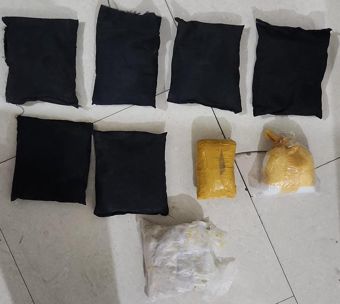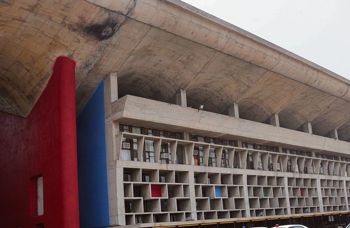
Sanjay Garg wants tradition to not appear as a burden to the new generation but a legacy that it would take pride in
Monica Arora
Sanjay Garg, founder of the Raw Mango brand of Indian clothing, sarees and textiles is a man who knows his mind. Born and brought up in a typical Marwari family of Mubarikpur, a village in the Alwar district of Rajasthan, he is a son of the soil for whom eating or wearing organic is not a fad or trend but actually a way of life. Having grown up amidst earthy and rustic people and places has conditioned him and his aesthetic sensibility, which is deeply rooted in his passion to “revive an interest” in traditional Indian weaves, handlooms and textures.
He reiterates the fact that he finds the term “revival” highly abused and believes that he strives to make traditions and cultural heritage not appear as a burden for the new generation but a legacy that it would take pride in by virtue of it being holistically Indian.
For Sanjay, life and its experiences are his greatest muse, inspiration and teacher. He feels that it is imperative to present his own interpretation of art, beauty, motifs and colours in his collections rather than viewing them the way we are taught to view them — through pre-conceived notions. For instance, his latest collection ‘Heer’ has been inspired by his brother’s marriage to a sardarni from Chandigarh.
An amalgam of Punjabi and Islamic influences drawn from the Punjab of pre-Partition India, the collection features rich silk brocades, crisp organza and shimmering satins in vibrant colours, pulsating with the vibe of a young Punjabi girl, Heer, at the threshold of her wedding day. Sanjay found Punjabi culture extremely refreshing and much different from the typical image of Punjabis that he had been made to believe in whilst he attended the wedding ceremonies. He was, therefore, driven to create a collection, which presented his version of Punjabiyat.
In fact, most of Sanjay’s designs are a product of his likes or sometimes even dislikes of places or objects or people. According to him, it is this ability of observation merged with a great deal of sensitivity, which hones a designer’s oeuvre. While he believes fashion is a serious business, the idea is also to fill the vacuum in the market when it comes to traditional Indian handlooms and woven textiles and Raw Mango has been striving to do just that since its 10 years of its existence.
According to Sanjay, “Perfection is an illusion and people are always running after it”. He finds that the imperfection and that touch of rustic and raw in local weaves such as khadi. By far, he loves working with mashru fabric, which originated from the Muslim belief that silk should not touch a person’s skin. Hence, what came into being was a warp-face setting of cotton and silk weaving in which the side touching the skin comprised cotton blends while appearing like fine silk on the outer surface. This was the mashru fabric, which could be worn by ijaazat or permission (as the term mashru denotes) by the Muslim community and Sanjay loves its fall and versatility.
So much is his faith and love for Indian symbology that he chose the ambi or kairi or the raw mango as the name for his brand.
“The raw mango or paisley is recognised as a motif for embellishing clothes and fabrics from Kashmir in the North to Kanyakumari in the South and from Assam in the East to Rajasthan in the West and its most distinct element is its imperfection, which makes it so unique.”
Sanjay envisages blending several disciplines such as music, art and sculpture within the canvas of his creations. So, on the anvil is a music album echoing the strains of Raw Mango as a hundred per cent authentic Indian voice. To commemorate a decade of the brand, he also wants to create 10 unique objects from material such as iron, glass, bronze and so on.
His Delhi boutique and studio situated at Satbari Farms in Chhatarpur is an oasis of tranquility and beauty, simple yet complete in its haveli-like architecture and landscaped verdant lawns with plastered white walls, besides hundreds of books and curios dotting various nooks and crannies. The courtyards are usually buzzing with some kaarigar or craftsmen quietly creating new products or working on a new design idea discovered by Sanjay during one of his travails or over an interesting conversation. The entire complex reverberates with creative energy and Sanjay can be seen flitting between spaces effortlessly donning the proverbial myriad creative hats all at once while basking in the glory of the forays made by Raw Mango both in Indian as well as international fashion fora.



























